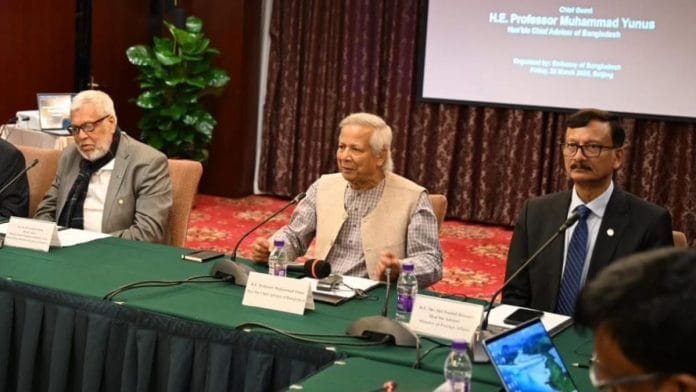New Delhi: Bangladesh’s interim leader, Muhammad Yunus, further fuelled tensions in ties with India after he claimed his country was the only gateway to South Asia in his meeting with Chinese officials Friday, challenging India’s longstanding position as the trade hub for the BIMSTEC region.
“The eastern part of India, known as the Seven Sisters, is landlocked. They have no access to the ocean. We are the only guardians of the ocean in this region. This opens up huge possibilities,” Yunus said, addressing Chinese officials in a video circulating widely.
“Bangladesh could be an extension of the Chinese economy—building, producing, and marketing goods for China and the world.”
He made the remarks during his 4-day bilateral visit to China, his first foreign visit since forming the interim government last year, breaking the long-standing tradition to visit India first. The comments are being seen as an attempt to bolster Bangladesh’s influence ahead of the BIMSTEC summit, where Dhaka will take over as the next chair.
Positioning Bangladesh as the region’s sole maritime gateway, he encouraged China to expand its influence by integrating Bangladesh into its strategic network.
The Bay of Bengal Initiative for Multi-Sectoral Technical and Economic Cooperation, or BIMSTEC, was set up in 1997 to boost regional cooperation between its member states. It currently has seven members, which also include Sri Lanka, Thailand, Myanmar, Nepal and Bhutan. Thailand is the current chair, with the sixth summit set to be hosted in Bangkok on 3-4 April.
The Bangladeshi leader’s comments came a day after a high-level BIMSTEC delegation visited Tripura to explore ways to boost regional trade. They inspected the Agartala Integrated Check Post (ICP), a key gateway for India-Bangladesh commerce.
The visit, part of the Trade Facilitation Capacity Building initiative by the Indian think tank ICRIER, included 20 officials from all seven BIMSTEC countries. Yunus’s overtures to China have raised diplomatic tensions with India, which has traditionally viewed Bangladesh as a key partner in South Asia.
ThePrint reached out to the Ministry of External Affairs over the phone for comment. The report will be updated if and when response is received.
However, senior government sources told CNN News18 that India firmly rejected Yunus’s claim about Bangladesh being the ocean’s sole guardian in the region as “factually inaccurate”, and opposed his characterisation of the northeast, calling it an attempt to promote Chinese expansionism.
India has also demanded a retraction from Bangladesh’s interim leader, the media report added.
Meanwhile, reports say that Yunus has requested a meeting with Prime Minister Narendra Modi on the sidelines of the BIMSTEC Summit in Bangkok, but New Delhi is yet to confirm whether the meeting will take place.
Also Read: Bangladesh & ‘reliable friend’ China agree to negotiate FTA as Yunus meets Xi in Beijing
Yunus’s strategic realignment, China & BIMSTEC
BIMSTEC holds strategic significance for India’s foreign policy due to the Bay of Bengal’s importance as a global trade route and its access to vital resources. According to a 2020 Ministry of External Affairs report, India leads in areas like counterterrorism, transport, tourism and disaster management within BIMSTEC.
Moreover, since 2016, India has promoted BIMSTEC, shifting away from the South Asian Association for Regional Cooperation (SAARC) after relations with Pakistan, a SAARC member, deteriorated.
Since then, the growing importance of maritime security, its continental neighbours, and the attempts to counter China’s influence have further strengthened India’s focus on BIMSTEC, particularly, Beijing’s Belt and Road Initiative (BRI). Increased cooperation in the region also aligns with India’s blue economy and maritime security and connectivity goals—the latter through initiatives like SAGAR (Security and Growth for All in the Region).
India also aims to strengthen regional ties with projects such as the BIMSTEC Free Trade Agreement and Coastal Shipping Agreement. New Delhi has actively hosted meetings, like the 2016 BIMSTEC Leaders’ Retreat and the 2017 National Security Chiefs’ meeting, to discuss security and connectivity in the Bay of Bengal region.
Yunus’s comments come amid Bangladesh’s shifting geopolitical orientation, particularly since a domestic political reset after anti-government protests ousted Hasina in August last year.
His visit to Beijing saw both countries sign nine agreements covering economic and technical cooperation, infrastructure, media, culture and health. China and Bangladesh agreed to negotiate a Free Trade Agreement (FTA) and are officially starting talks on optimising an investment agreement in a bid to increase trade and economic cooperation.
He also advocated for Chinese involvement in the Teesta River Comprehensive Management and Restoration Project—an initiative previously pursued with India under the Hasina administration.
Bangladesh also welcomed Chinese involvement in several key infrastructure projects, including the Mongla Port Facilities Modernisation and Expansion Project.
During this trip, China pledged approximately $400 million for the modernisation of Bangladesh’s southwestern Mongla seaport, $350 million for expansion of the China Economic and Industrial Zone in Chattogram, and another $150 million in technical assistance.
(Edited by Sanya Mathur)
Also Read: PM Modi to visit Sri Lanka after attending BIMSTEC Summit in Bangkok






